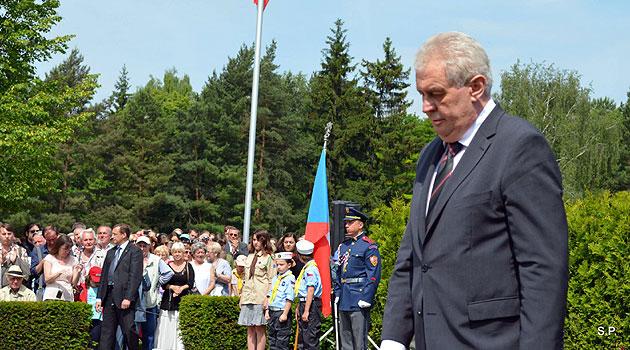Czech President calls DSSS party neo-Nazis, they say he parrots them on issue of migrants

Speaking at the commemorative ceremony marking the anniversary of the obliteration of the village of Lidice during the Second World War, Czech President Miloš Zeman warned against neo-Nazism, saying that it is inconspicuously beginning to threaten Czech society. His remarks on 11 June marked the 74th anniversary of the annihilation of the village by Nazi soldiers and specifically mentioned the members of the Workers Social Justice Party (DSSS) in the Czech Republic and the ultra-right party led by Marian Kotleba in Slovakia, calling them both neo-Nazis.
DSSS chair Tomáš Vandas objected to that label, saying that Zeman today is talking about the migration “crisis” in the same way that he and his party have been talking about it for years. The Czech President said neo-Nazis profit from the indecision of democratic politicians when they become incapable of facing up to problems.
Zeman also said the tragedy of Lidice obliges us not only to remember the past, but also to actively combat the manifestations of neo-Nazism spreading under various pretexts in the Czech Republic. He called the ideology one based on racial hatred, on rejection of the plurality of opinions, and on the imposition of uniforms and uniformity both mentally and physically.
The Czech President also said Kotleba’s party in Slovakia was actively aided by representatives of the Czech DSSS, led by Vandas, during the recent elections there. “Anybody who actively supports neo-Nazism, albeit in a neighboring country, is objectively a neo-Nazi himself,” Zeman said.
Vandas objected to the President’s characterization and called on him to apologize for his “baseless and insulting allegations against the citizens of this country.” Speaking to the Czech News Agency, the DSSS chair said: “Our opinions are not at all extremist, on the contrary, our opinions, which have not changed over the years, are now being taken up by the so-called democratic parties.”
The DSSS chair said that when it comes to the wave of refugees now entering Europe, Zeman is just repeating today what Vandas himself has been saying for years, opinions for which he has previously been convicted and sentenced by the courts. “In the year 2009, I was convicted for a speech I made in Brno where I warned against a tsunami of refugees. Mr President is now repeating the very same thing I said years ago. If that means he feels he is an extremist and a neo-Nazi, then we welcome him aboard,” Vandas said.
Zeman said in his 11 June speech that he believes bans are not the solution to the problem of neo-Nazis. “Let’s promise here, at Lidice, that we will do more than just remember the past, because that is not enough. Let’s promise to actively work against those on our territory who are once again beginning to disseminate neo-Nazism under the broadest possible range of pretexts,” he said.
The predecessor to the DSSS, the Workers Party (DS) was banned by the courts several years ago, but its adherents established a new group with an altered name (DSSS). Vandas was sentenced to four months in prison, suspended for 20 months, for making a speech referring to a “destructive tsunami of immigrants”, but never did prison time for it thanks to the amnesty announced by Czech President Klaus when he left office.
The DSSS chair insists, therefore, that it would be hard for a genuinely neo-Nazi party to legally work in the Czech political system. “If Mr President has evidence [of neo-Nazi activity] then he should call upon the Government to propose a ban on the party’s activity,” Vandas said in a press release.
The commemoration at Lidice marked the day that the Nazis burned the Central Bohemian village to the ground, shot the male inhabitants, sent some of the children to be re-educated and most of them to the gas chambers, and sent the women to concentration camps in retaliation for the assassination of Reichsprotektor Reinhard Heydrich on Czech territory. The ceremony on 11 June was attended by ambassadors, local councilors and mayors, other politicians, representatives of churches and civic groups, surviving eyewitnesses to the events there, and others.
